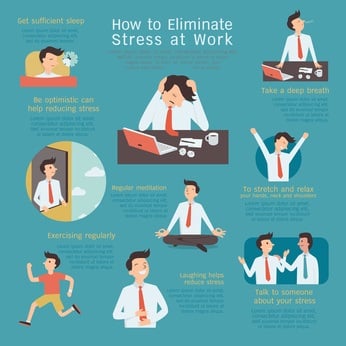 Wouldn't it be fantastic if we could eliminate the obstacles of everyday life and lead a stress-free existence? Wouldn't that just make everything so much easier? In any sales organization, it's often echoed how stressful sales process can be – there can be tons of peaks and valleys and many things are out of your control. You're consistently accountable for deadlines, due dates, targets, forecasts – oh, and actually selling stuff. Managing and growing a pipeline isn't easy and can be extraordinarily stressful. No wonder all of those Sterling Cooper Draper Pryce guys had beverage carts desk-side.
Wouldn't it be fantastic if we could eliminate the obstacles of everyday life and lead a stress-free existence? Wouldn't that just make everything so much easier? In any sales organization, it's often echoed how stressful sales process can be – there can be tons of peaks and valleys and many things are out of your control. You're consistently accountable for deadlines, due dates, targets, forecasts – oh, and actually selling stuff. Managing and growing a pipeline isn't easy and can be extraordinarily stressful. No wonder all of those Sterling Cooper Draper Pryce guys had beverage carts desk-side.
Unfortunately for all of us in the trenches, the notion of eliminating stress is, at best, wildly unrealistic and at worst, an open-and-shut case of impossibility. Stress being what it is (a biological reaction to external influences that demand something of us or threaten us), there are certainly valid reasons why the fight-or-flight response exists. For example, in the event that one were to be hypothetically attacked by a bear (author's note: I have NOT seen The Revenant at time of writing. No spoilers please.) While the demands of everyday life have evolved, our body has not kept pace and is simply not equipped to differentiate unanswered smartphone notifications from a very real threat of physical harm. Mentally, we can process the difference, but this doesn't prevent our heart rate from picking up speed, our upper back from tensing, or our face from flushing (among a host of other potential involuntary physical effects).
So stress is a physical reaction to the things we perceive as challenging. Additionally, it's out of our control as to what our physiological processes as a challenge, so the prospect of eliminating stress seems to be looking more and more dismal the further you read. What we can do, however, is mitigate it to the best of our abilities by putting yourself in a position where you can get beat stress to the punch. I've developed a bit of a borderline obsessive interest in productivity and personal development and as a result, I've read a thing or two about stress management tactics and would be happy to share a few points I've found most helpful in my daily structure. By no means is this an exhaustive list, but it's a solid starting point if I do say so myself.
 Time Management
Time Management
The phrase "Either you run the day or the day runs you" gets thrown around the office a lot and the sentiment is strong. Taking ownership of your time in the middle of a noisy, collaborative sales bullpen is a struggle, but if you aren't intentional about your time, you can find yourself easily getting caught up in distractions and interruptions. I've found it crucial to my productivity to begin my day by clearly defining what needs to be done, in which order, and how long each task should take (then I give myself roughly double that length of time). From there, it is all about single-tasking in blocked off intervals. Use some sort of tool to organize these tasks, whether it be a notebook, To-Do app, paper calendar, or dry-erase board, find what works for your brain (I personally use a combination of Google Calendar and Workflowy to outline my day). For more on this, I’d highly recommend anything Tim Ferriss has ever written, such as this article on taking control of your time.
By managing your time, you're able to get ahead of your tasks and encounter far less stress when it comes down to the wire. Most of my stress comes from brain disorganization and when you take a second to bring one task to the forefront, it becomes the only task that matters.
Distractions
Now that you've got your plan, be ruthless and stick to it! Do not allow yourself to become distracted by the wall of white noise that exists outside of your bubble. Studies suggest that always-on notifications are a 'toxic source of stress'. In this vein, I've done the unthinkable and shut off notifications on all of my devices (aside from calls & texts) and it is remarkable how much I've felt a weight lifted. I still check in on email and social media as needed and when it is appropriate for me to do so. The result, though, is that I no longer have sporadic alerts interrupting my workflow and have seemingly adapted to not impulsively checking or experiencing so-called "phantom vibrations." Highly recommended, though I understand if that may be a bridge too far. Point being: it is perfectly OK to be selfish with your time!
Another wacky tip that most of you will not want to do: Install StayFocusd, which is a Chrome extension that prevents you from browsing time-wasting websites for anything more than your predefined daily minute allowance. I've set mine at 15 minutes and if nothing else, I know that at most I've only wasted 15 minutes a day being a slacker. Give it a shot if you're so inclined.
By minimizing distractions, you're eliminating the ever-looming threat of interruption. You'll be more present, get more accomplished, and will be able to dial in more effectively. All of that is to say, distraction can be a major stressor.
Get Away
I just spent a good block of text focused on getting things done to get ahead of stress before it hits, but sometimes the best way to alleviate pressure is to just take some time to yourself. Get out for lunch as much as possible – though there are the inevitable eat-at-your-desk days, it's important to break up the day and get a change of scenery. You'll often find that it's far easier to re-calibrate and reassess your priority tasks by stepping away temporarily.
I'd also encourage shorter, sporadic breaks as needed. In these instances, find a quiet space where you can relax and reset. Do something totally unrelated to work and re-assign your attention for a moment. Even if you only get 5-10 minutes to zero out, you will get back to your desk with more clarity and focus than you left with. In fact, implementing a daily meditation habit is a surprisingly consistent component of the structure of the majority of top performers and successful individuals. I recommend reading this great book on Daily Rituals.
By taking some time to check out and regroup, you will break up your day and be able to approach tasks with more clarity when you return to your desk. Even if it is a few minutes of meditation, take some time to decompress.
Nutrition & Fitness
All of the prior talking points were ideas centered on how best to execute your work day, but now let's take a step back and focus on one bullet that will have a direct impact on everything else you do: your health.
 Ironically, when we experience stress, nutrition and fitness often take the backseat. A stressful day may be combated with skipping the gym, eating poorly ("comfort foods"), or turning to other alternative stress-relief tactics (drinking, smoking, etc…), and all of this ultimately impacts your cognitive ability, attention-span, energy levels, sleep patterns, and so on and so forth. This is creating a negative feedback loop where you begin to drown in stress-debt. Even if you do all of the right things and incorporate each of the previous suggestions into your day, you're essentially looking at everything through a dirty window. Think of it this way: you can drive with the windows up and avoid constant acceleration if you want to improve MPG, but things still go south if you don't get regular oil changes.
Ironically, when we experience stress, nutrition and fitness often take the backseat. A stressful day may be combated with skipping the gym, eating poorly ("comfort foods"), or turning to other alternative stress-relief tactics (drinking, smoking, etc…), and all of this ultimately impacts your cognitive ability, attention-span, energy levels, sleep patterns, and so on and so forth. This is creating a negative feedback loop where you begin to drown in stress-debt. Even if you do all of the right things and incorporate each of the previous suggestions into your day, you're essentially looking at everything through a dirty window. Think of it this way: you can drive with the windows up and avoid constant acceleration if you want to improve MPG, but things still go south if you don't get regular oil changes.
More specifically, regular exercise has been shown to reduce stress on a chemical level. Exercise promotes increased levels of GABA, a neurotransmitter that has the effect of inhibiting the chemical response that cause stress in the body. Additionally, a diet too high or low in carbs/sugars can throw off your blood sugar levels and caffeine has been shown to increase cortisol production, leading to inhibited cognitive function, increased blood pressure, and slowed metabolism. This is just scraping the surface on this subject, but it should give some indication as to how vital your fitness is to your overall health.
By devoting attention to your personal health, you're making an investment in yourself and making sure that your engine is running smoothly. So stay hydrated, take your vitamins, don't eat junk food (not always, at least), and get some physical activity in.
Wrap Up
So that's what I've got for you so far. By incorporating better habits and bringing more intentionality to our day, we can help our body to better be able to cope with our stressors. We'll never be able to eliminate stress, but we can absolutely strengthen ourselves against its effects.
If you've gotten anything out of this, plan to utilize any of it, would like to see more, or think I'm flat out wrong, please drop a comment below, as I'd love to know your thoughts!
Share This Story, Choose Your Platform!
What our happy clients are saying
Let Us Help You Source the Sales Talent You Need
Whether you’re building a team or replacing a key role, our Candidate Sourcing Platform provides a fast, flexible, and employer-focused solution.
Tell us more about your business and how we can help.
Treeline Inc.
Your Award-Winning Sales Recruitment Partner
15 Lincoln Street, Suite 314, Wakefield, MA 01880











